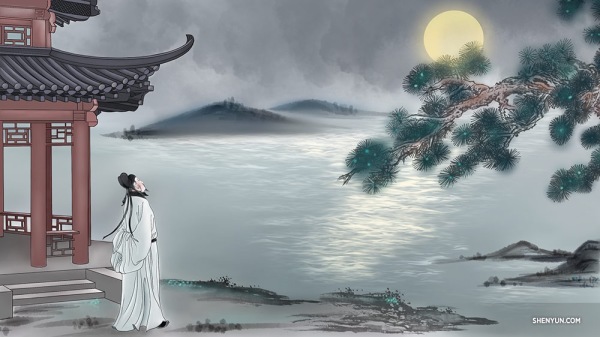
诗仙李白的《静夜思》,流传千古。(图片来源:神韵艺术团官网)
送友人
青山横北郭,白水饶东城。
此地一为别,孤蓬万里征。
浮云游子意,落日故人情。
挥手自兹去,萧萧班马鸣。
TAKING LEAVE OF A FRIEND
Blue mountains lie beyond the north wall;
Round the city’s eastern side flows the white water.
Here we part, friend, once forever.
You go ten thousand miles, drifting away
Like an unrooted water-grass.
Oh, the floating clouds and the thoughts of a wanderer!
Oh, the sunset and the longing of an old friend
We ride away from each other, waving our hands,
While our horses neigh softly, softly....
这首送别诗,充满诗情画意;诗人与友人策马辞行,情意绵绵。“孤篷”,篷是植物篷草,遇风吹散,诗里借喻游子,译者译为an unrooted water-grass,很好。“班马”,与其它马脱离的马。
怨情
美人卷珠帘,深坐蹙蛾眉。
但见泪痕湿,不知心恨谁。
THE NIGHT OF SORROW
A lovely woman rolls up
The delicate bamboo blind.
She sits deep within,
Twitching her moth eyebrows.
Who may it be
That grieves her heart?
On her face one sees
Only the wet traces tears.
这首五言绝句,以描写一位美人的神态,表现她的哀怨之情。“珠帘”,有珠子镶嵌的帘子,应是bead curtain,并非bamboo blind(竹帘)。“深坐”,久久呆坐。“蛾眉”:delicate eyebrows; long slender eyebrows,直译为moth eyebrows,缺乏美感,有些肉麻。
夜静思
床前明月光,疑是地上霜。
举头望明月,低头思故乡。
ON A QUIET NIGHT
I saw the moonlight before my couch,
And wandered if it were not the frost on the ground.
I raised my head and looked out on the mountain moon,
I bowed my head and thought of my far-off home.
这首小诗,用叙述的语气,写远离故乡之情,意味深长,耐人寻绎。“夜静思”:静静的夜里产生的思绪。“床”不译作bed,译成couch。“明月”译作the mountain moon,意为明月清晰,隐约可见月球上的山脉。
金陵酒肆留别
风吹柳花满店香,吴姬压酒唤客尝,
金陵子弟来相送,欲行不行各尽觞。
请君试问东流水,别意与之谁短长。
PARTING AT A TAVERN OF CHIN-LING
The wind blows the willow bloom and fills the whole tavern with fragrance
While the pretty girls of Wu bid us taste the new wine.
My good comrades of Chin-ling, hither you have come to see me off.
I, going, still tarry; and we drain our cups evermore.
Pray ask the river, which is the longer of the two—
It’s east-flowing stream, or the thoughts of ours at parting?
这是李白即将离别金陵(今江苏省南京市)东游扬州时留赠友人的送别诗。“留别”,临别时赠诗给送行者。“吴姬”,吴地的青年女子,这里指酒店中的侍女。“压酒”,新酒酿熟时,压紧榨床取酒。“金陵子弟”译作good comrades of Chin-ling,意为志同道合的金陵好朋友。“欲行”的是李白,“不行”的是金陵子弟,并非李白欲行又止。
长干行
妾发初覆额,折花门前剧。
郎骑竹马来,绕床弄青梅。
同居长干里,两小无嫌猜。
十四为君妇,羞颜未尝开。
低头向暗壁,千唤不一回。
十五始展眉,愿同尘与灰。
常存抱柱信,岂上望夫台。
十六君远行,瞿塘滟滪堆。
五月不可触,猿声天上哀。
门前迟行迹,一一生绿苔。
苔深不能扫,落叶秋风早。
八月蝴蝶黄,双飞西园草。
感此伤妾心,坐愁红颜老。
早晚下三巴,预将书报家。
相迎不道远,直至长风沙。
A LETTER FROM CHANG-KAN
I would play, plunking flowers by the gate,
My hair scarcely covered my forehead, then.
You would come, riding on your bamboo horse,
And loiter about the bench with green plums for toys.
So we both dwelt in Chang-kan town,
We were two children, suspecting nothing.
At fourteen I became your wife,
And so bashful that I could never bare my face,
But hung my head, and turned to the dark wall;
You would call me a thousand times,
But I could not look back even once.
At fifteen I was able to compose my eyebrows,
And beg you to love me till we were dust and ashes.
You always kept me the faith of Wei-sheng,
Who waited under the bridge, unafraid of death,
I never knew I was to climb the Hill of Wang-fu
And watch for you these many days.
I was sixteen when you went on a long journey
Traveling beyond the Keu-Tang Gorge,
Where the giant rocks heap up the swift river,
And the rapids are not passable in May.
Did you hear the monkeys wailing
Up on the skyey hight of the crags?
Do you know your foot-marks by our gate are old,
And each and every one is filled up with green moss?
The mosses are too deep for me to sweep away;
And already in the autumn wind the leaves are falling.
The yellow butterflies of October
Fluttering in pairs over the grass of the west garden.
My heart aches at seeing them....
I sit sorrowing alone, and alas!
The vermillion of my face is fading.
Some day when you return down the river,
If you will write me a letter beforehand,
I will come to meet you—the way is not long—
I will come as far as the Long Wind Beach instantly.
这是一首写商妇的爱情和离别的诗,全诗熔叙事、状景、抒情于一炉。长干,今南京;古金陵,居民多经商。“剧”,游戏。“十五始展眉”四句,描写夫妇婚后的炽烈爱恋。《庄子 · 盗跖》云:“尾生与女子(约会)于梁(桥)下,女子不来,水至不去,抱梁柱而死。”小夫妻宁愿同生共死,怀着尾生抱柱的信念。英译You always kept the faith of Wei-sheng, Who waited under the bridge, unafraid of death, 出现Wei-sheng (尾生)这个名字。“迟行迹”,“迟”,等待。“行迹”,指与丈夫共同生活时留下的足迹。“长风沙”,地名,在今安徽安庆市东长江边上。
(全文完)
责任编辑:张云峰 来源:看中国
短网址: 版权所有,任何形式转载需本站授权许可。严禁建立镜像网站.
【诚征荣誉会员】溪流能够汇成大海,小善可以成就大爱。我们向全球华人诚意征集万名荣誉会员:每位荣誉会员每年只需支付一份订阅费用,成为《看中国》网站的荣誉会员,就可以助力我们突破审查与封锁,向至少10000位中国大陆同胞奉上独立真实的关键资讯,在危难时刻向他们发出预警,救他们于大瘟疫与其它社会危难之中。










